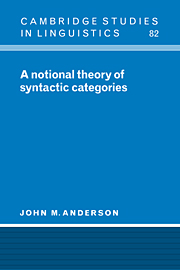Preface
Published online by Cambridge University Press: 14 August 2009
Summary
There were the bits he understood. They were bad enough. But the bits he didn't understand were worse.
The initial quotation here and the chapter epigraphs are drawn from Patrick White's novel The solid mandala, which and particularly Arthur therein have much to say about grammar and meaning. The present work was concluded by its author when the bits he didn't understand were/are still overwhelming; and drawing a line at this point is, as is normal, relatively arbitrary. This means that a number of issues which many might regard as crucial to present-day concern with syntax have scarcely been touched on in what follows, or have even been ignored, and those areas treated have received vastly varying degrees of attention. Also, the recognition here of previous work remains partial, and adapted to the needs of the arguments put forward in particular sections. But there is for such as the present enterprise no great virtue in comprehensiveness of bibliographical reference (or even a possibility thereof). Nor have I striven to establish throughout a consistent temporal endpoint for reference: in a work whose writing extends over any length of time, achieving this would be equivalent to having all of the Forth Bridge freshly painted at the same time.
Information
- Type
- Chapter
- Information
- A Notional Theory of Syntactic Categories , pp. xi - xiiPublisher: Cambridge University PressPrint publication year: 1997
